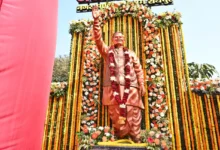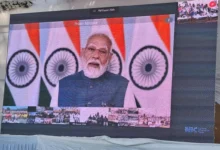Kerala: Kerala opened its doors for BJP, Tamil Nadu is also hopeful

Kerala: Kerala’s long-standing reputation as a ‘BJP-free state’ is over, marking a significant shift in its political landscape. Former Rajya Sabha member and actor-turned-politician Suresh Gopi created history by winning the Thrissur Lok Sabha constituency by a remarkable margin of 75,686 votes. The result sent ripples through both the LDF and UDF camps.
A closer analysis shows that Gopi successfully secured a large chunk of votes even from traditional Congress supporters, as evident from the significant drop of 86,965 votes for the Congress compared to its 2019 performance. In contrast, CPI leader and former minister VS Sunil Kumar representing the LDF managed to increase his vote count by 16,916 compared to the last election. This bolstered the Left’s argument that the Congress was responsible for Kerala’s exit from the ‘BJP-free’ status. However, the Congress in Kerala regained its old glory by winning 18 of the 20 seats. This result is an important lesson for both the LDF and the UDF, highlighting the need for introspection and strategic rebalancing in view of the political dynamics.
BJP’s vote share rises in Kerala
Although it was generally anticipated that Suresh Gopi would perform impressively, his landslide victory surprised even the BJP camp. After the polling, a BJP campaign manager expressed confidence that Gopi would win by a margin of around 35,000 votes. However, the actual results far exceeded these expectations. Right from the beginning of the counting process, Suresh Gopi took a strong lead over his opponents, and maintained a substantial lead throughout. CPI’s popular leader Sunil Kumar failed to reduce the gap with Gopi at any point during the counting. In all rounds of counting, Suresh Gopi consistently maintained a lead of 10,000 to 20,000 votes, thereby strengthening his dominance. The UDF candidate, K Muraleedharan, son of late Congress leader K Karunakaran, suffered a humiliating defeat, finishing third with 30% vote share.
Beyond the victory in Thrissur, it is important to note the significant progress the BJP has made in Kerala’s political landscape in terms of vote share. The party’s vote share rose to 16 per cent from the 13 per cent it secured in 2019, marking a remarkable rise. Despite facing setbacks in the 2021 assembly elections, where their vote share fell to 11 per cent, the BJP has made a comeback. The cumulative vote share of the NDA, including key ally BDJS (Bharatiya Dharma Jana Sena), is around 18 per cent, a big jump for the alliance. The BDJS, an offshoot of the SNDP, a community organisation of the Ezhava caste traditionally seen as a bastion of the Left in Kerala, has added some weight to the NDA’s electoral fortunes.
In Thiruvananthapuram, where sitting MP Shashi Tharoor pulled off a close contest, BJP’s Rajeev Chandrasekhar posed a tough challenge. Initially, Chandrasekhar took a lead in the early hours of counting, raising BJP’s hopes of winning two seats in the state. However, as the final round of counting began, including votes from the coastal region, Tharoor made a comeback and won by a slim margin of 16,077 votes. Chandrasekhar, a Union minister and owner of leading Malayalam television channel Asianet, rocked both the LDF and the UDF by securing 35.5 per cent of the votes – a significant lead for the BJP compared to 2019 when Kummanam Rajasekharan had managed to secure 31 per cent.
Notably, a drop in UDF votes is also evident in Thiruvananthapuram. Tharoor’s victory margin fell from 99,989 votes or 41 per cent in 2019 to 37 per cent of the total polled this time. The LDF, on the other hand, maintained its vote share, securing 25.7 per cent of the votes, which is equal to 25.6 per cent in 2019. This underlines the shift of votes from the Congress to the BJP in Thiruvananthapuram. Apart from these two constituencies, where the BJP had targeted victory, the party managed to make substantial gains in some other constituencies as well. For instance, the BJP/NDA secured an average of 25 per cent votes in ten Lok Sabha constituencies in the state. In eight constituencies, including Thiruvananthapuram and Thrissur, the BJP improved its vote share by securing 20 per cent and above. In Pathanamthitta, where Sabarimala is located, Anil Antony – son of Congress leader and former chief minister AK Antony – a new entrant to the party secured 25 per cent votes, while Left social media handles projected him as a sorry figure by unleashing a barrage of trolls against him. What is more worrying for the LDF and UDF is that the BJP came first in 11 assembly constituencies and second in 7, which is a first in the electoral history of the state. In 2019, the BJP managed to secure second position in only seven assembly constituencies and could not win anywhere.
















